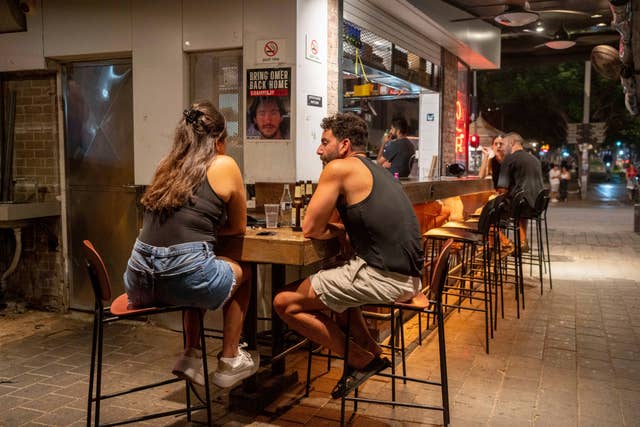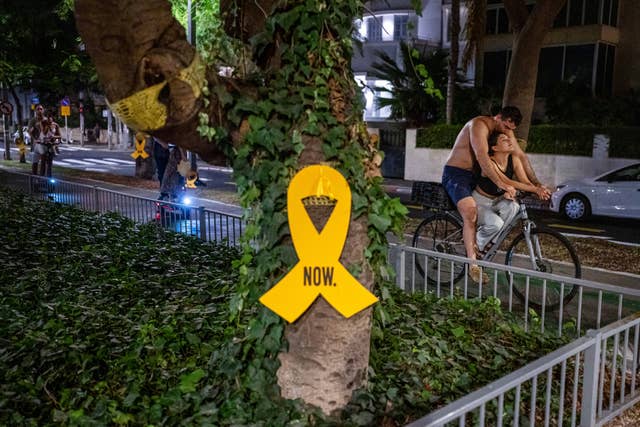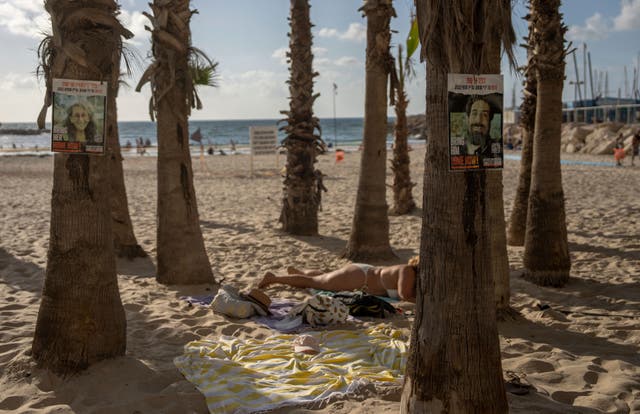
Simon Marks 10am - 12pm
5 October 2024, 09:24

Many Israelis feel depressed, despondent and angry as the war with Hamas stretches into its second year.
At a busy Tel Aviv entertainment district, diners spill into outdoor seating and clink glasses as music fills the air. There’s laughter, there’s life. But all around the patrons, staring down from lampposts and shop windows, are pictures of hostages held in Gaza, stark reminders that Israel is at war and forever scarred by the deadliest attack in its history.
As Israel’s war with Hamas reaches its one-year mark, it can seem on the surface that much of life in the country has returned to normal. But with many still reeling from Hamas’s October 7 attack, hostages remaining in captivity and a new front of war with Hezbollah in the north, many Israelis feel depressed, despondent and angry as the war stretches into its second year.
Uncertainty over the future has cast a pall over virtually every part of daily life, even as people try to maintain a sense of normality.

“The conversation about the situation is always there,” said activist Zeev Engelmayer, whose daily postcard project featuring illustrations of hostages or Israel’s new reality has become a fixture at anti-war protests.
“Even those who are sitting in coffee shops, they’re talking about it, in every single situation I see it. It’s impossible to get away from it. It has entered into every vibration of our life.”
– Rattled Israelis feel hopeless
Hamas’s attack in which some 1,200 people were killed and 250 kidnapped shattered Israelis’ sense of security and stability in their homeland.
Many have been rattled by the war’s evolution. Nearly 100 hostages remain in Gaza, with less than 70 believed to be alive. Israelis have experienced attacks – missiles from Iran and Hezbollah, explosive drones from Yemen, fatal shootings and stabbings – as the region braces for further escalation.
They have watched as Israel is accused of committing war crimes and genocide in Gaza and becomes increasingly isolated internationally.
“I’m almost 80 – we grew up in this country with a feeling that we have short wars, and we win them quickly,” said Israeli historian Tom Segev. “We’re not used to a long war.”
Israelis have long harboured a sense that their country, born of the Holocaust’s ashes and surviving numerous regional threats, is a success story, Mr Segev said. They have strived, he added, for a normality akin to that of European and North American people, though their reality for decades has been anything but.
“I think that history is going backwards,” he said of the past year. “Everything we have achieved on our way to becoming a normal state isn’t happening.”
Reminders are everywhere. At a Hebrew University graduation in Jerusalem, a large yellow ribbon was placed in front of the stage. A graduate who did not attend because his brother was killed in Gaza the previous day was honoured.

– Internal divisions grow
Israel’s long-standing internal divisions briefly eased in the aftermath of Hamas’s attack, but have only intensified since. Weekly protests calling for a ceasefire deal that would free hostages are attended mostly by secular Jewish Israelis who oppose Prime Minister Benjamin Netanyahu and his government.
According to a September poll by Jerusalem-based think tank Israel Democracy Institute, 61% of right-wing Jewish Israelis – Mr Netanyahu’s base – support the war continuing.
Occupied with their own trauma, most Israelis paid scant attention to the ongoing destruction in Gaza, even as the Health Ministry there put the Palestinian death toll at more than 41,000. Israeli media have reported little on the devastation. Israelis calling for a ceasefire are driven overwhelmingly by the hostages’ plight.
Many Israelis are furious at leaders and the military for not preventing Hamas’s attack. Tens of thousands of people are expected at an alternative ceremony marking one year since then, as a statement against the government’s official commemoration. The state ceremony is being pre-recorded without a live audience, in part because of fears of heckling and disruptions.
“The thing we lost on October 7 – and we haven’t gotten it back – is our feeling of security,” Muli Segev, executive producer of Eretz Nehederet, a popular sketch comedy show, said. “Despite everything, we have been able to create a life here that’s pretty open and Western.
“Especially in Tel Aviv, we go about our lives, and we don’t think about the fact that our lives are really just pauses between wars and between explosions of violence.”
In the war’s early months, the show’s sketches were gentler, focusing on what united Israeli society, such as the massive civilian volunteer response. Over time, they featured more pointed satire, including a reimagining of negotiations if the hostages were Israeli politicians’ children – released in less than two hours.
Parts of life have rebounded – beaches full of people, bustling cafes, concerts and sports back on schedules. But residents also check for the nearest bomb shelter, deal with school cancellations when violence flares up, and avoid domestic travel hubs that are now off-limits. Heartbreaking news arrives regularly, including the deaths of six hostages in August.

“It’s a nightmare; we’re just getting used to it,” said Maya Brandwine, a 33-year-old graphic designer who witnessed the Jaffa shooting that killed seven on Tuesday. “I have so little hope. I’m sure the situation will only get worse.”
Dror Rotches, a 47-year-old graphic designer, said from a Tel Aviv coffee shop: “We try to go out when we can, meet friends and try to forget for a few hours. Then we go home and keep slogging through the mud.”
Others simply cannot return home. More than 60,000 from Israel’s northern border with Lebanon are displaced. Thousands from the southern towns ransacked on October 7 are in temporary housing. Tens of thousands of reserve soldiers are serving their second or third tour of duty, adding strain to their families and jobs.
“As the war goes on and on and we can’t see the end, there’s also a type of very large worry over the future, and, for some, if there is even a future here,” Muli Segev said.
– At this cafe, life meets war
Cafe Otef seems like any of Tel Aviv’s ubiquitous coffee shops: Patrons laugh and sip speciality coffee beside a playground; light rock music plays. But next to the sandwiches and cakes are chocolates made from the recipes of Dvir Karp, who was killed in the October 7 attack, and cheeses from Kibbutz Be’eri, where more than 100 died and 30 were taken hostage. Totes and T-shirts for sale declare “We shall thrive again”.
The cafe, named for the region next to the Gaza border, is run by residents of Re’im, one of the kibbutzes struck. It is the second shop in the new chain, each aiming to support people of a southern Israeli town where lives were upended.
“The war still continues for almost a year, and I feel that if we won’t live, we will die,” said Reut Karp, cafe owner and Mr Karp’s ex-wife. She lives with most of her kibbutz in temporary housing nearby.
The cafe gives her purpose as her community deals with trauma and the uncertainty of returning home. While it is strange to see people flowing through the doors, going about life as normal, she and the staff have found comfort in the routine.
“We must take ourselves out of bed and continue to live and to work and to have the hope,” Ms Karp said. “Because without this hope, we don’t have anything.”